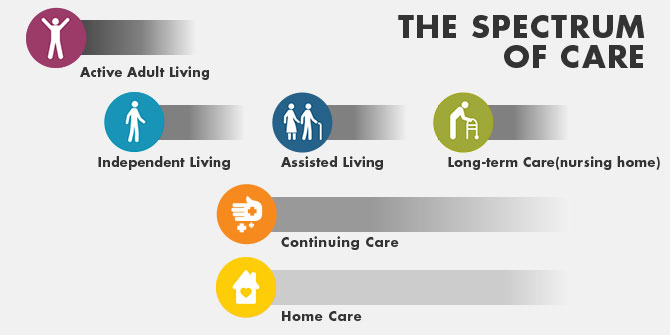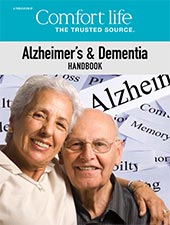What to know about this topic:
- Types of retirement living in Bowmanville
- How much are Bowmanville retirement home fees?
- Medical and safety services in Bowmanville
- Recreation and social activities for Bowmanville seniors
- Getting around Bowmanville
- How to choose a retirement home
- Bowmanville retirement community regulations
Bowmanville, located in southern Ontario, is the largest city in the municipality of Clarington. There are a few excellent retirement homes and a variety of senior health and safety services in the wider region, as well as no shortage of festivals and attractions year round for older adult residents to enjoy.
Types of retirement living in Bowmanville
Retirement homes in Bowmanville, Ontario serve the Durham region with the full spectrum of care, offering assisted and independent living options as well as care for seniors with dementia and Alzheimer’s.

Independent and assisted living
Retirement homes with both independent and assisted living suites offer seniors a wide spectrum of care choices. Independent living packages provide full dining, light cleaning and other services while assisted living is designed for seniors requiring more care and needing more access to medical staff and services for health and other personal needs. Seniors who choose a retirement home that offers both independent and assisted living can remain within their community as they age, with the support of friends, peers and staff with whom they are familiar and comfortable.
Long-term care
Seniors with dementia, Alzheimer’s or another cognitive disease have the option of receiving 24-hour, customized care. The focus of these retirement home programs, sometimes referred to as Secure Memory Care Home Areas, is to prevent further cognitive decline in a safe and comfortable setting that is familiar and home-like.
How much are Bowmanville retirement home fees?
The monthly rent of a retirement home in Bowmanville depends greatly on the type of suite and level of care you choose. The average rent in Bowmanville’s retirement communities is approximately $3, 533 a month — slightly higher than the provincial average of $3,204.
Retirement savings, pensions, Canadian Pension Plan, Old Age Pension and other income sources like the sale of the family home are the most common ways for seniors to pay for retirement.
Seniors with high medical or prescription expenses may want to consider applying to the Trillium Drug Program (TDP). TDP helps seniors who have high prescription drug costs relative to their household income. Seniors over the age of 65 years old who live in Ontario and have a valid Ontario health card are able to apply.
Medical and safety services in Bowmanville
Modern retirement homes make resident wellness a priority, and offer preventative health care services and amenities that help residents stay socially and emotionally engaged as well as physically active and healthy. Some examples of health and wellness services provided in independent, assisted and Alzheimer’s care residences include:
- An on-site doctor, or a doctor who visits residents on a regular basis
- On-site nursing staff, often available 24/7
- An on-site pharmacy and medication assistance services
- Exercise programs with access to a personal trainer
- Physiotherapy
- Preventative wellness programs
- Recuperative programs
- Dietary and nutritional programs
- Assistance with daily living activities including bathing, dressing, nutrition and mobility
- Assistance with lifestyle maintenance including outings, social engagements and pet care
- Continence management programs
- Palliative care services

In case of an emergency or for seniors who need more serious care, Bowmanville retirement communities are located close to the Lakeridge Health Hospital. The Lakeridge Health Hospital is also implementing senior-friendly patient rooms that are designed to help infection control. The Lakeridge Health Falls Prevention Program is another initiative aimed at helping seniors remain safe.
Other senior service programs in Bowmanville area include:
- The Clarington Older Adult Association (COAA), which undertakes senior advocacy, social events, community volunteerism and support services for members.
- The Durham Elder Abuse Network.
- Continuing education courses which are offered in creative arts and fitness.
- Support services including the Older Adult Day Program, foot care, health promotions, walking programs, income tax assistance, van transportation, information and referral and meal service. Learn more about adult day programs.
- Recreation and drop in services including shuffleboard, carpet bowling, billiards, badminton, darts, floor curling, tennis, softball, cards and chess, volleyball, special events, day trips and more.
- The Senior Citizens Club which supervises and plans a variety of recreational activities for members including dances, euchre, bridge, cribbage and a choir.
- The Peer Mentoring Program in which trained volunteers listen and offer assistance to anyone over 55 facing the challenges of aging, adjusting to life after loss, reaching an important decision or making connections in the community. All calls are confidential.
- The Alzheimer Society of Durham Region
- The Arthritis Society
- Durham Deaf Services
- Senior Support Services (905-697-4320), which offers supportive assistance for day-to-day activities and companionship to seniors. Services include shopping for groceries, clothing, items for the home or gifts for special occasions, driving to appointments, assistance with laundry and home organization, computer coaching, light housekeeping and company for an afternoon out to tee or to see a movie.
Recreation and social activities for Bowmanville seniors
In addition to medical programs, physical, emotional and cognitive health care programs are also important for seniors. Bowmanville's retirement homes and community centres offer amenities such as spas and beauty salons, fitness and wellness centres, swimming pools, libraries, religious services and family programs.
The Durham region has a growing senior population. Currently, the percentage of the total population who are over 55 years old is 10, 095 and according to the region, over the next 10 years the senior population (adults over the age of 65 years old) is expected to grow by over 60%.
As a result of this increase in the senior demographic, city staff and members of the Clarington Older Adult Association (COAA) are working together to form the Clarington Older Adult Strategy, for which money in the city’s 2014 budget has been set aside. This plan will be looking at a number of factors affecting seniors in the area. including:
- Program needs
- Facility options
- Reviewing staffing at COAA
- Reviewing volunteering levels at COAA
- Meeting the health requirements of the aging population

One of the benefits of living in a retirement community is the social focus. Many retirement homes employ an activity director to help organize fitness programs and recreational programs inside the residence as well as trips to local community centres or town festivals. Bowmanville retirement homes are close to shopping malls, restaurants and 17 local community centres. The Canadian Tire Motorsport Park is another popular attraction amongst seniors who are car enthusiasts. Most retirement communities organize day trips and evenings out, allowing residents to go out for an afternoon of shopping, and continue to be engaged in the town’s events.
Bowmanville is home to a vibrant senior community, which supports a number of community festivals through volunteerism. Some popular festivals amongst the senior community include the:
- Apple festival and craft sale
- Maple festival and all that jazz
- Fabulous 50’s festival
- Summerfest
- Moonlight Madness
Getting around Bowmanville
For active, independent seniors who want to get around Bowmanville (Clarington) on their own, Durham Region Transit provides senior tickets and passes. The Go Train’s PRESTO passes can also be purchased at a discount to seniors. There are also a number of private companies that offer seniors door-to-door transportation services.
How to choose a retirement home
Many seniors consider moving to a retirement home at a time of crisis – after a fall, illness or loss of a spouse. Making a choice about retirement living during a time of crisis is both stressful and limiting. It’s better to make the move before a crisis occurs because finding the right retirement home requires thought and pre-planning.
How to Choose a Retirement Community from Comfort Life on Vimeo.
For more points to consider and some common questions and concerns about retirement homes, please visit our page for seniors considering a retirement home.
You need to first think about:
- What you want
- What you need
- What you can afford
- Your preferred location
Pre-plan for the future. Ensure your:
- Medical needs are met
- Residence can grow with your needs as your activity, medical and financial circumstances change over time
- Finances are in order. Remember to factor rent and cost of living increases into your calculation
Use our retirement calculator to get an idea of what you’ll be able to afford. Then, use our advanced search to create a shortlist and rrange meetings and tours with the staff of retirement residences that meet your requirements. Call each and arrange meetings and tours.
Remember to ask about overnight stays - some will let seniors stay overnight to get a better idea of what it’s like to live in the community.
Don’t forget to download our free eBook on the ultimate retirement tour guide for important information and questions to ask during your tour. Contact the residences shown above to get started with your search.
Bowmanville retirement community regulations
Retirement communities across Ontario are subject to the Retirement Home Regulatory Authority (RHRA), which was created under the Retirement Homes Act of Ontario in 2010. In order to be licensed, retirement homes must first receive approval from the RHRA in order to operate, and must undertake ongoing inspections by the RHRA to ensure they continue to comply with licensing requirements and safety standards.
Seniors and their families should check the RHRA standing of any retirement home they are considering. Industry experts also recommend considering a retirement residence that is a member with the Ontario Retirement Communities Association (ORCA), a voluntary association for retirement homes throughout Ontario.




